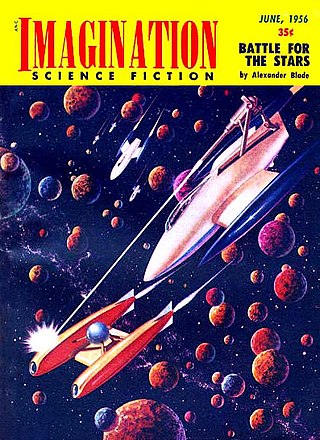Related Research Articles

Science fiction first appeared in television programming in the late 1930s, during what is called the Golden Age of Science Fiction. Special effects and other production techniques allow creators to present a living visual image of an imaginary world not limited by the constraints of reality.
A parallel universe, also known as an alternate universe, parallel world, parallel dimension, alternate reality, or alternative dimension, is a hypothetical self-contained plane of existence, co-existing with one's own. The sum of all potential parallel universes that constitute reality is often called a "multiverse". While the six terms are generally synonymous and can be used interchangeably in most cases, there is sometimes an additional connotation implied with the term "alternate universe/reality" that implies that the reality is a variant of our own, with some overlap with the similarly named alternate history.
Syfy is an American basic cable television channel, which is owned by the NBCUniversal Media Group division and business segment of Comcast's NBCUniversal. Launched on September 24, 1992, the channel broadcasts programming relating to the science fiction, horror, and fantasy genres. As of January 2016, Syfy is available to 92.4 million households in America.

Paranormal romance is a subgenre of both romantic fiction and speculative fiction. Paranormal romance focuses on romantic love and includes elements beyond the range of scientific explanation, from the speculative fiction genres of fantasy, science fiction, and horror. Paranormal romance range from traditional romances with a paranormal setting to stories with a science fiction or fantasy-based plot with a romantic subplot included. Romantic relationships between humans and vampires, shapeshifters, ghosts, and other entities of a fantastic or otherworldly nature are common.

ReGenesis is a Canadian science-fiction television series produced by The Movie Network and Movie Central in conjunction with Shaftesbury Films. The series, which ran for four seasons from 2004 to 2008, revolves around the scientists of NorBAC, a fictional organization with a lab based in the city of Toronto. The organization investigates problems of a scientific nature, such as bioterrorism, mysterious diseases, or radical changes in the environment throughout Canada, the United States, and Mexico. NorBAC is headed by David Sandström, the chief scientist, and molecular biologist. Through this character, the show often addresses topical social, political, and ethical issues related to the science at hand.
John Kenneth Muir is an American literary critic. As of 2022, he has written thirty reference books in the fields of film and television, with a particular focus on the horror and science fiction genres.
Spy-fi is a subgenre of spy fiction that includes elements of science fiction, and is often associated with the Cold War. Features of spy-fi include the effects of technology on the espionage trade and the technological gadgets used by the characters, even though the technologies and gadgets portrayed are well beyond contemporary scientific reality.

Alcoa Presents: One Step Beyond is an American anthology series created by Merwin Gerard. The original series was broadcast for three seasons by the American Broadcasting Company (ABC) from January 1959 to July 1961.
Welcome to Paradox was a Canadian science fiction television series aired on the Sci Fi Channel in the U.S. and subsequently on Showcase in Canada. It was first broadcast on August 17, 1998, ran for one season, with the final episode being released November 9, 1998. As this was part of a crop of new shows produced in 1998 by Sci Fi Channel and it was not successful beyond the first season, it was never placed in syndication. Betaville was the original title for the series.
"The Veldt" is a science fiction short story by American author Ray Bradbury. Originally appearing as "The World the Children Made" in the September 23, 1950, issue of The Saturday Evening Post, it was republished under its current name in the 1951 anthology The Illustrated Man.

Fantasy is a genre of speculative fiction involving magical elements, typically set in a fantasy world and usually inspired by mythology or folklore. The term "fantasy" can also be used to describe a "work of this genre", usually literary.

The Outer Limits is a science fiction television series that originally aired on Showtime, Syfy, and in syndication between 1995 and 2002. The series is a revival of the original The Outer Limits series that aired from 1963 to 1965.

Daniel X: Watch the Skies is a teen science fiction novel written by James Patterson and Ned Rust. It is the second novel in the Daniel X series and was released on July 27, 2009.

Space opera is a subgenre of science fiction that emphasizes space warfare, with use of melodramatic, risk-taking space adventures, relationships, and chivalric romance. Set mainly or entirely in outer space, it features technological and social advancements in faster-than-light travel, futuristic weapons, and sophisticated technology, on a backdrop of galactic empires and interstellar wars with fictional aliens, often in fictional galaxies. The term does not refer to opera music, but instead originally referred to the melodrama, scope, and formulaicness of operas, much as used in "horse opera", a 1930s phrase for a clichéd and formulaic Western film, and "soap opera", a melodramatic television series. Space operas emerged in the 1930s and continue to be produced in literature, film, comics, television, video games and board games.

Westworld is an American science fiction-thriller media franchise that began with the 1973 film Westworld, written and directed by Michael Crichton. The film depicts a technologically advanced Wild-West-themed amusement park populated by androids that malfunction and begin killing the human visitors; it was followed by the sequel film Futureworld (1976). The franchise moved to television in 1980 with the short-lived series Beyond Westworld on CBS. In 2016 a new television series based on the original film debuted on HBO; the critically acclaimed series broadcast four full seasons before being cancelled.
References
- ↑ Frank Garcia; Mark Phillips (27 September 2013). Science Fiction Television Series, 1990-2004: Histories, Casts and Credits for 58 Shows. McFarland. pp. 35–. ISBN 978-0-7864-9183-4.